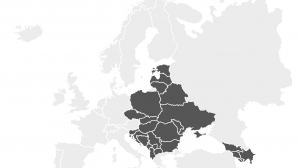Bulgaria hopes to join the the ERM-2 exchange rate mechanism — the precursor to eurozone membership — before the end of 2019. Previously, the Balkan country – an EU member since 2007 – had aimed to join the bloc’s banking union and its two-year “waiting room” for eurozone membership in July.
“There has never been a better moment,” said Vladislav Goranov, Bulgaria’s finance minister. “There has never been more trust, both economic and political, from our western partners to the perspective of Bulgaria entering the close circle of European integration.”
Being outside of the eurozone has certainly not aided the Bulgarian economy. In fact, in 2019, it was named the world’s fastest shrinking economy; rife with social inequality and corruption. With the lowest average monthly salary in the EU of 575 euros, hopes for a more robust democracy and a buoyant and independent economy have been unfounded.
However, some economists are unsure whether Bulgaria will fare better within the eurozone. The EU has pencilled 10 billion euros worth of European aid to Bulgaria up until 2020, but with that income set to cease in less than a year, concerns linger that Bulgaria could be the next blot on eurozone crisis timelines such as that created by DailyFX, with aid funding only papering over the cracks in the short-term.
Croatia is another country looking to adopt the euro, and to become part of the borderless Schengen area. German Chancellor Angela Merkel suggested in May, during a visit to Zagreb, that both were certain to happen during the term of the next European Commission.
“There is still some work to be done, but Croatia is on the right track, and Germany wants to be its partner in those efforts,” she said.
Plans are being accelerated to implement the euro within the Croatian economy by 2025. Croatia has been an EU member state since 2013, but there is a general feeling among the Croatian people that the introduction of the euro could lead to an increase in inflation. In 2007, Slovenia experienced average annual price increases of 3.8 per cent after it adopted the euro. One crumb of comfort for Croats will be that the euro is already becoming the most popular currency for purchasing big-ticket items such as property and automobiles. The Croatian central bank may also look to weaken the Croatian kuna against the euro to ease the burden on domestic exporters when the time comes.
Meanwhile, the Czech Republic is one EU member state that remains hugely reticent to adopting the euro. Recent polls have suggested that the Czech people are against such a move, largely because of the ongoing eurozone debt crisis and the prospect of being responsible for the bailout of the failing economies of other EU member states. Less than a third of Czechs said they wished to be part of the euro. In the Czech Republic, wage rises of 5.3 per cent in 2017 were experienced, with hourly rates the equivalent of 10 euros per hour. Meanwhile, some of the leading EU economies are experiencing flatlining wage growth.
In Hungary, public support for adopting the euro has waned significantly in recent years. Almost three-quarters (71 per cent) of the population surveyed in 2011 supported joining the euro, but only 58 per cent supported the prospect in 2018. Hungary’s debt-to-GDP is still well outside the maximum 60 per cent figure for eurozone convergence, standing at 73.6 per cent in the ECB’s 2018 report. Policymakers in Hungary also fear that being part of the eurozone would halve the nation’s ability to influence its economic development. Exchange rates or monetary policies could no longer be used to provide short-term economic support. With debt-to-GDP still far too high for the EU’s standards, the forint looks set to remain for many years yet.
In April, Jarosław Kaczyński, the leader of Poland’s ruling conservative party Law and Justice (PiS) said that the country has no immediate intention of joining the eurozone and has invited other political parties to sign a joint declaration, which contains an assurance that Poland will adopt the euro only when it reaches the economic level of western countries.
However, Mr Kaczyński may be out of step with the public, not least business. According to a survey by the Polish Lewiatan Confederation taken at the time of his statement, 54 per cent of Polish entrepreneurs said that they are in favour of the euro and only 14 per cent were against. What’s more, 70 per cent of those in favour would like to use the European currency within the next five years.






Add Comment